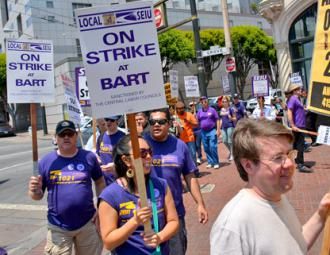Will backlash imperil $3.5 billion BART bond?
 Three years after union strikes that infuriated hundreds of thousands of commuters, the Bay Area Rapid Transit system finds itself facing sharp new criticism over its management and budgeting practices. This backlash could make it difficult for BART to win the two-thirds support it needs in November for a $3.5 billion bond to upgrade the system’s aging infrastructure and rail cars.
Three years after union strikes that infuriated hundreds of thousands of commuters, the Bay Area Rapid Transit system finds itself facing sharp new criticism over its management and budgeting practices. This backlash could make it difficult for BART to win the two-thirds support it needs in November for a $3.5 billion bond to upgrade the system’s aging infrastructure and rail cars.
The 2013 showdown ended with BART employees winning a 15.4 percent raise that the San Jose Mercury-News reported made them the best-compensated transit workers in the U.S. While the end to the strike made the public happy, critics said the deal would hurt BART’s finances in the long haul and didn’t do nearly enough to reduce the cost of benefits and perks with few parallels in public employment.
Now, promises to address these issues were put aside in the latest contract talks, which recently concluded with an extension of the previous deal for four years that also included cost-of-living pay hikes.
Forty-two local leaders praised the deal as a step in the right direction. But local media coverage — and some politicians — paint a different picture.
No-strike provision left out of deal
State Sen. Steve Glazer, D-Orinda, called the deal a compromise he could live with for now. But he also told the Mercury-News that the deal didn’t address a range of important issues, starting with the urgent need for a no-strike clause to prevent the chaos seen in 2013.
Orinda called on BART to withhold “cost-of-living increases from highly paid managers; undertake a salary survey of agency workers before the next contract talks; establish a capital fund so repairs and replacement parts can be paid for on an as-needed basis instead of by massive bond measures; release clear projections of retirement costs; … and commit to training replacement workers in the event of another work stoppage.”
Bay Area News Group columnist Dan Borenstein suggested the pact was irresponsible. The deal increased BART’s projected $400 million operating deficit over the next decade to nearly $480 million. Borenstein noted that negotiators raised no questions about some uniquely generous provisions:
- Retirement savings account: On top of pensions, workers also receive BART-funded retirement savings accounts. The annual district contribution for each worker is $1,869 plus 1.63 percent of salary.
- Health care coverage: Workers and most retirees receive full family health care coverage for $138 a month, regardless of the number of dependents.
- Work week: Train operators, station agents and other members of the Amalgamated Transit Union work only 37.5 hours per week, not 40.
- Leave time: BART workers receive up to six weeks paid vacation annually, of which they can cash out a week each year. They receive 12 days of sick leave, and can apply unused portions toward their pension service credit or cash it out. Plus they receive 13 paid holidays.
- Annual bonuses: Workers receive $1,000 annual bonuses for each year that ridership exceeds projections by 2 percent.
Were maintenance dollars used for compensation?
Borenstein, among others, has suggested that one reason the November bond is so big is that for years, normal BART maintenance may have been scaled back to pay for worker compensation. Such maintenance is considered crucial to keep infrastructure and rail cars in good shape.
What this wide-ranging criticism means for the fate of the BART bond is uncertain. In a February letter, 32 Bay Area elected officials seemed to link their support for a multibillion-dollar bond to hard guarantees of no future strikes. Now, many of these officials, starting with Glazer, are no longer taking that hard line.
But commuters may not be eager to support a bond after BART approved a contract that offers no protections against an encore of the 2013 disruptions they endured.
Chris Reed
Chris Reed is a regular contributor to Cal Watchdog. Reed is an editorial writer for U-T San Diego. Before joining the U-T in July 2005, he was the opinion-page columns editor and wrote the featured weekly Unspin column for The Orange County Register. Reed was on the national board of the Association of Opinion Page Editors from 2003-2005. From 2000 to 2005, Reed made more than 100 appearances as a featured news analyst on Los Angeles-area National Public Radio affiliate KPCC-FM. From 1990 to 1998, Reed was an editor, metro columnist and film critic at the Inland Valley Daily Bulletin in Ontario. Reed has a political science degree from the University of Hawaii (Hilo campus), where he edited the student newspaper, the Vulcan News, his senior year. He is on Twitter: @chrisreed99.
Related Articles
Internet Tax Would Kill Businesses
John Seiler: I’ve been writing about the suicidal idea for California to tax Internet sales. In a comment to that
CA-style feudalization is going national
March 16, 2013 By Chris Reed The feudalization of California that Joel Kotkin has written about so smartly for years
St. Louis Fed: There was no recovery
May 31, 2013 By John Seiler Gov. Jerry Brown and others have been proclaiming “California is back” because of greater


